Artnet News Pro
Who Won Auction Week? Here Are 12 Takeaways From New York’s Nearly $1.5 Billion Spring Sales
From the priciest work to the biggest flop (and more), here are our parting observations from New York's marquee auctions this May.
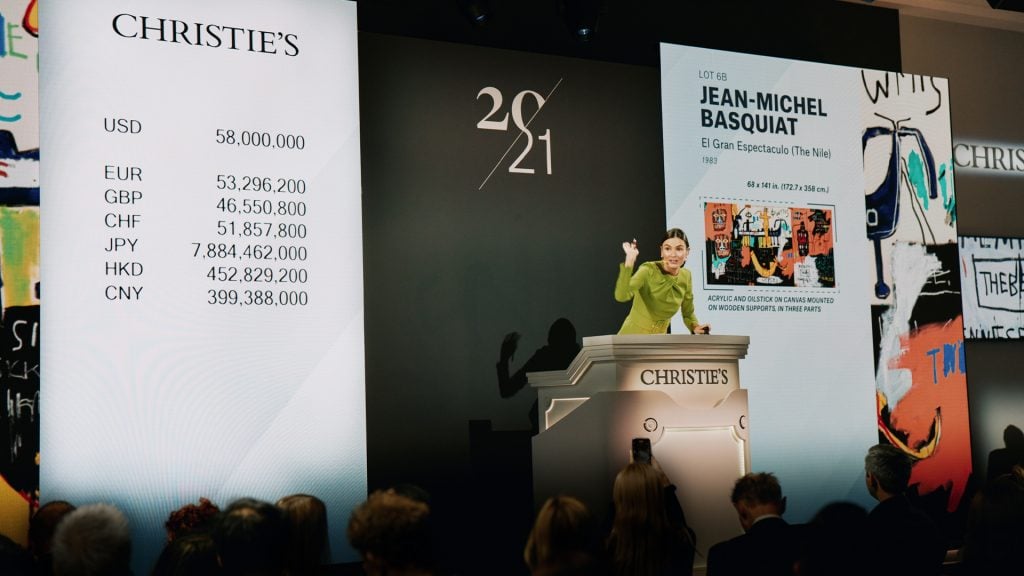
From the priciest work to the biggest flop (and more), here are our parting observations from New York's marquee auctions this May.

Artnet News

Selective buying and jitter-induced last-minute withdrawals characterized this auction season, which saw the dollar volume of art trading hands in the main sales at the Big Three houses in New York plummet to a little under $1.5 billion. While it was once hard to call a ten-figure cumulative sum a disappointment, the evening sales were down from previous seasons, when they bumped up closer to $2 billion and last spring ticked in at $2.4 billion.
The muted sales figures are further evidence of a long-anticipated market correction. Spirits (and profits) were dragged down by a slew of late-breaking withdrawals, including that of the cover lot in Sotheby’s youth-focused The Now auction, and more than a few passed lots across houses and categories. Christie’s dedicated sale of the Gerald Fineberg collection took on the mood of a fire sale, with the hammer total landing nearly 25 percent south of its presale low estimate.
Yet the market isn’t quite in freefall (yet). There were bright spots, too, including modern and contemporary trophy lots alike soaring above expectations into $50-plus million territory.
Luckily for readers of Artnet News Pro, we’ve got a team of in-house sleuths with long memories and eyes still sharp enough to keep all the fast-flying results in perspective after the long days and longer nights of this year’s May madness.
To make sense of what just happened (and maybe hint at what’s to come in the seasons ahead), the team (Annie Armstrong, Eileen Kinsella, Katya Kazakina, and Tim Schneider) huddled up to hand out our biannual auction awards.
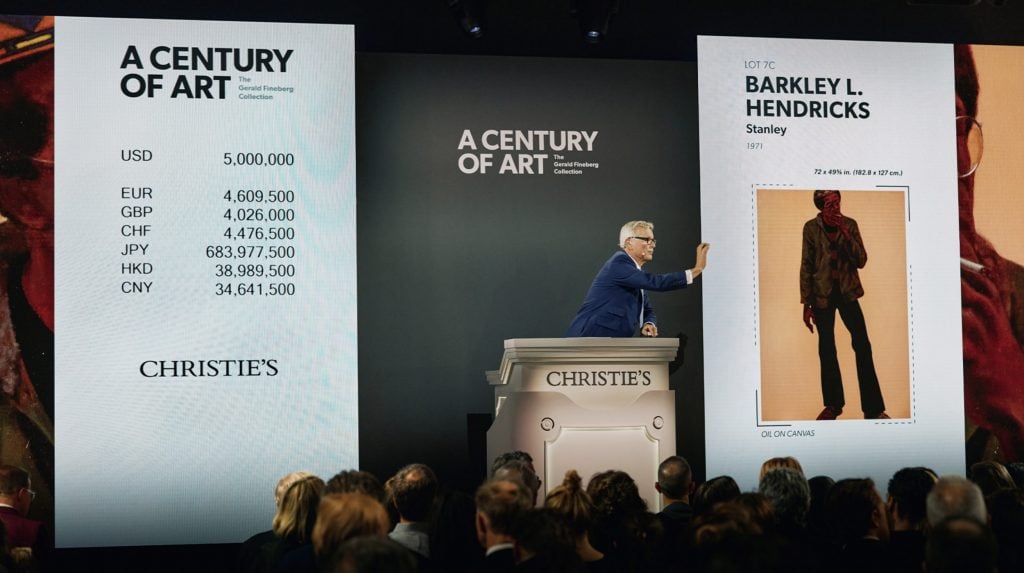
Christie’s Global President, Jussi Pylkkänen, sells Barkley L. Hendricks’s Stanley (1971) for a record-breaking $6.1 million. Photo courtesy Christie’s.
Christie’s came out on top again, as it did last fall, fuelled by the fireworks of the Paul Allen sale. The house’s total for four evening sales (the S.I. Newhouse collection, 20th Century, 21st Century, and the Gerald Fineberg collection) landed at $758.6 million, down from $1.25 billion it pulled in last spring.
Sotheby’s comparable total for four sales (the Mo Ostin collection, Modern, The Now, and Contemporary) was $631.5 million. The house pulled in another $38.1 million with a single lot sale of the Codex Sassoon, the earliest, most complete Hebrew Bible, which makes for a grand total of $669.6 million. That was down from $937.9 million last spring.
Phillips took in $70 million for its evening sale of 20th Century and contemporary art, a fraction of its $224.9 million total in spring 2022.
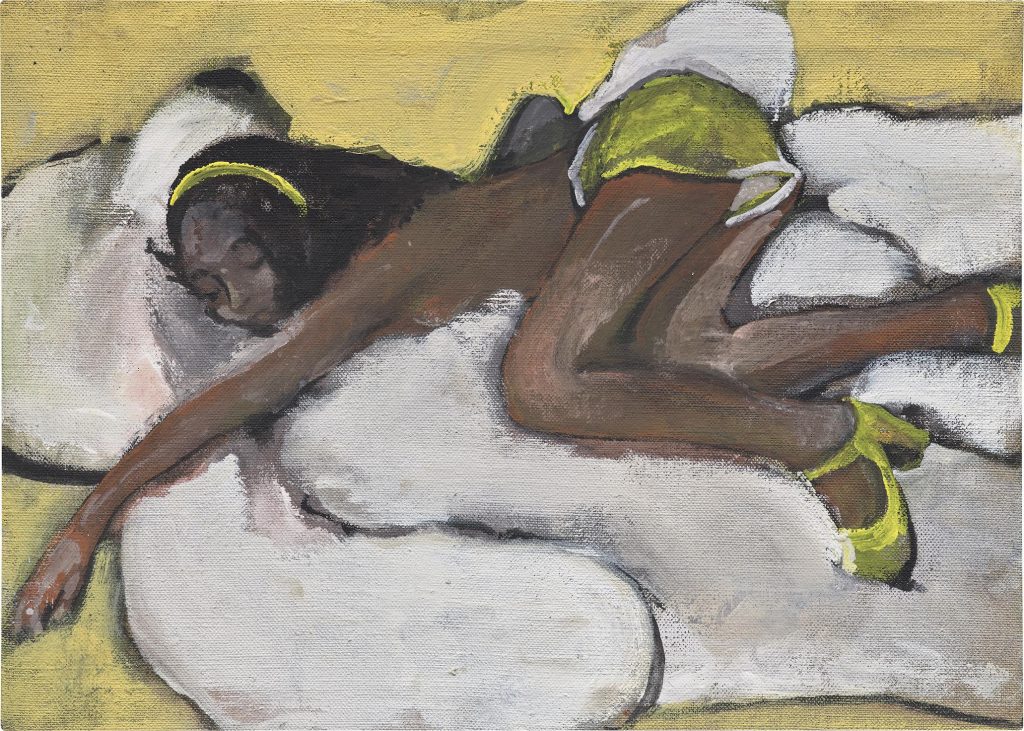
Noah Davis, Untitled, 2010. Courtesy of Phillips.
It’s typical for the flashiest bidding war to happen at the very beginning of the sale, often with an auction’s opening lot. This was certainly true for Phillips’s contemporary art evening auction, where an untitled work by Noah Davis inspired a 12-minute bidding war that ended with the piece selling for $991,000—nearly ten times its estimate of $100,000 to $150,000.
As noted in Artnet’s coverage of the sale, the piece sold to a bidder who also got into a lengthy battle over a Henry Taylor piece that also sold for well over its estimate. Here’s to that fastidious and persistent buyer.
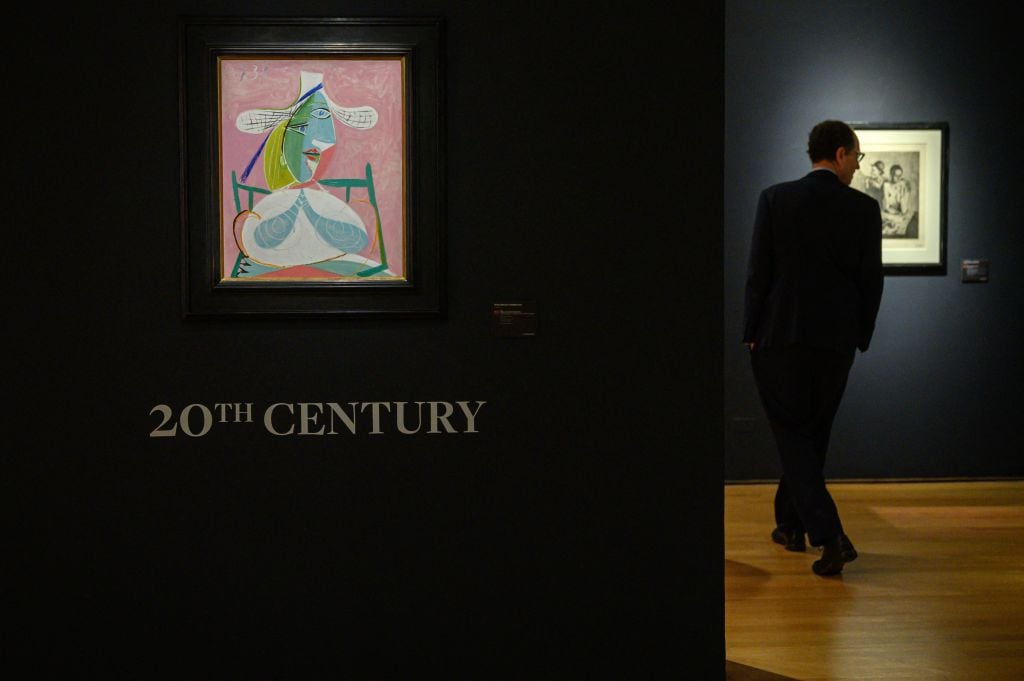
Pablo Picasso, Femme assise au chapeau de paille (Marie-Thérèse)(1938). Estimated at $20 million to $30 million. Displayed at Christie’s auction house in New York on May 2, 2023. (Photo by Ed JONES / AFP via Getty Images)
The season’s biggest casualty was Pablo Picasso’s 1938 painting, Femme assise au chapeau de paille (Marie-Thérèse), at the evening sale of the 20th century art at Christie’s on May 11. Estimated at $20 million to $30 million, it failed to progress past $18.5 million and was declared bought in.
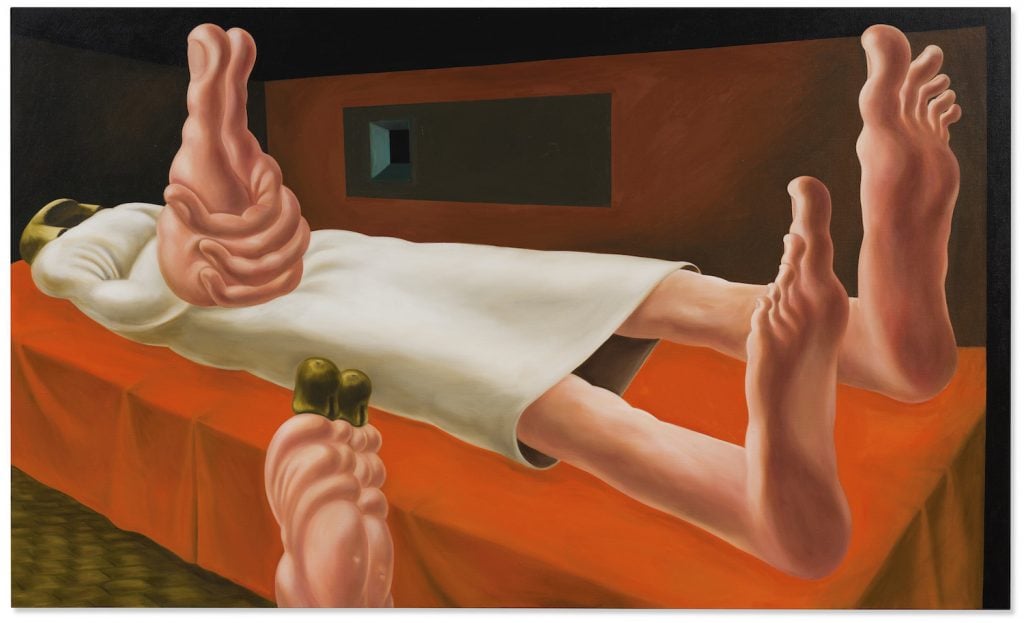
Louise Bonnet, Interior with Orange Bed (2021). Image courtesy Christie’s.
At Christie’s evening sale of 21st Century art on May 15, we noticed some particularly strong bidding come from a buyer seated in the front right section of the room and waving a paddle with the number #358. It caught our attention since the majority of demand for top lots is typically conveyed via Christie’s specialists manning the phone banks and speaking with individual clients.
And this bidder was on a spree. In rapid succession, a young Los Angeles-based art dealer Jack Siebert acquired three of the most buzzed about names in the current market. Seated next to him was another gentleman (his hair a man bun), who could be seen whispering into Siebert’s ear as he was bidding. Siebert purchased Louise Bonnet’s Interior with Orange Bed after fighting off competition from a determined online bidder, and winning it for $320,000 hammer (estimated at $300,000 to $500,000). He also bought Miriam Cahn’s Was Mich Anschaut, 02.10.2016, for $140,000 hammer (estimated at $70,000 to $100,000), and Danielle McKinney’s We Need to Talk for $160,000 hammer (estimated at $20,000 to $30,000). With premiums tacked on, his total price tag for the night was $781,200. “I buy for myself and several other clients,” Siebert said this week. “I don’t disclose names; my clients are discreet.”
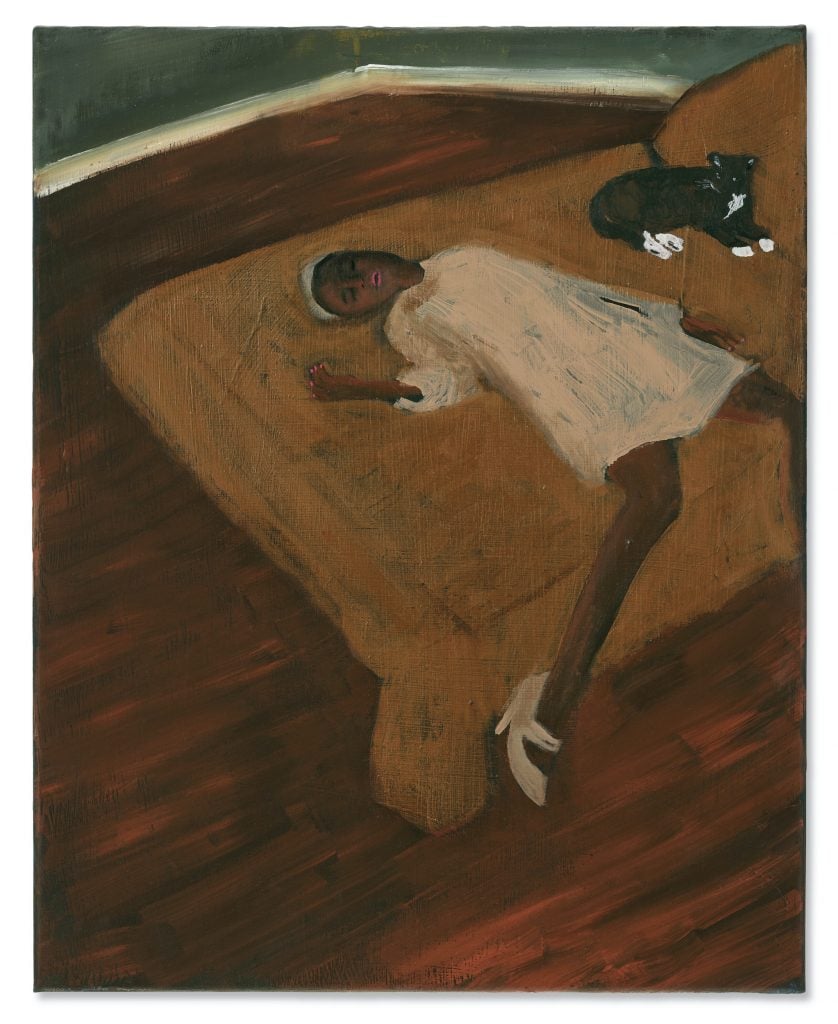
Danielle Mckinney, We Need to Talk (2020). © Christie’s Images Limited 2023. Courtesy of Christie’s.
Vojtěch Kovařík’s Léger-like portrait, Aphrodite (2020), achieved the highest price for a first-timer to the evening auctions this season, soaring to $378,000, more than three times its $120,000 high estimate. But Danielle Mckinney’s moody portrait We Need to Talk (2021) incited the more heated bidding war. Christie’s 21st Century sale was Mckinney’s first appearance in primetime. Expected to sell for no more than $30,000, We Need to Talk instead vaulted to a hammer price of $160,000, or $201,600 after fees, more than six times its high estimate.
Siebert was the buyer. He said he has followed Mckinney’s work for years. “Female representation has been a focus in my collecting and collection building for last half decade,” he said. “I feel fortunate to have a shared vision with my clients.”
Based on this level of demand, anticipate seeing more of Mckinney’s work soon at a nocturnal sale near you.
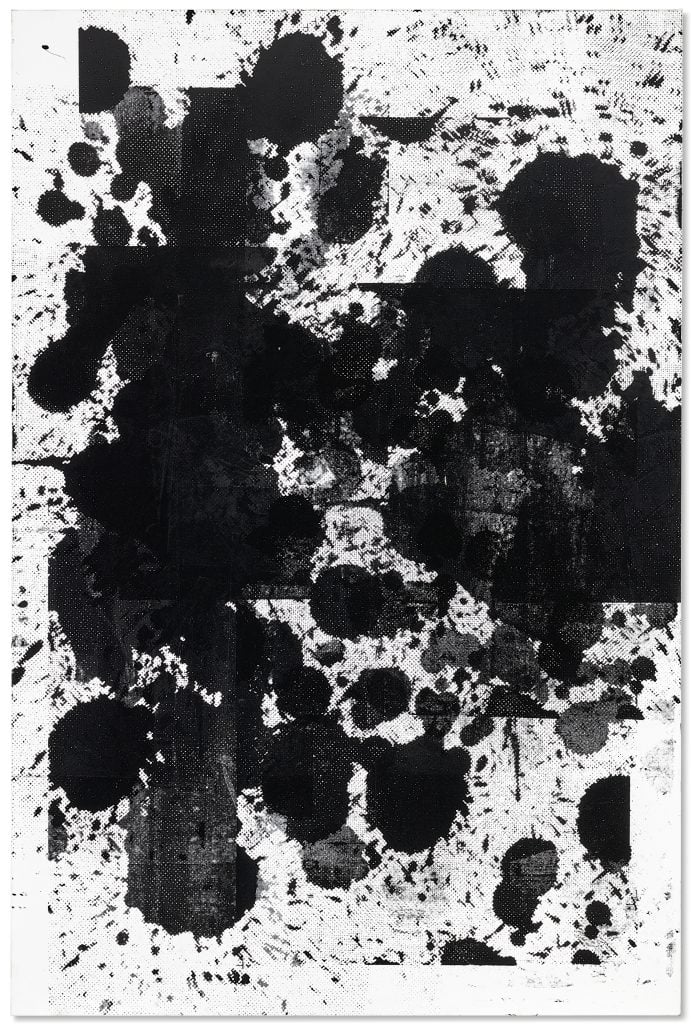
Christopher Wool, Untitled (2000). © Christie’s Images Ltd 2023.
Christopher Wool’s Untitled (2000) hammered at $650,000, or 57 percent below the low estimate of $1.5 million, at the evening sale of the Gerald Fineberg collection at Christie’s on May 17. There was only one bid for the work. The event had the largest number of works sold below the low estimate, with no irrevocable bids and estimates that suddenly seemed too high.
Wool’s market was soft across the auctions. At the Fineberg sale, a colorful text painting hammered at $8.4 million, 44 percent below the low estimate of $15 million. At Sotheby’s, a black and white painting spelling the word “PLEASE” hammered at $7.5 million, 25 percent below the low estimate of $10 million.
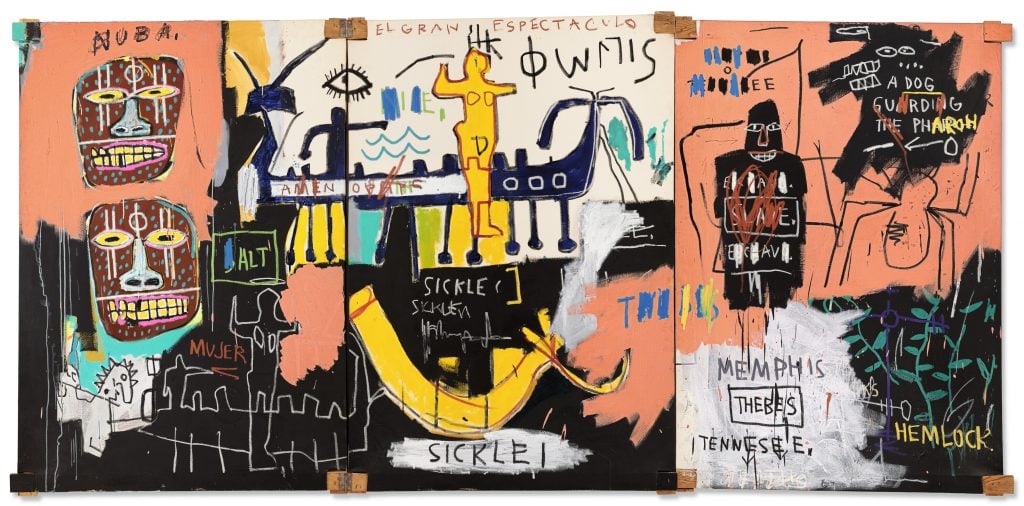
Jean-Michel Basquiat, El Gran Espectaculo (The Nile) (1983). Estimate on request; in the region of $45 million. Courtesy Christie’s Images Ltd 2023.
Jean-Michel Basquiat’s 1983 El Gran Espectaculo (The Nile) fetched $67.11 million after fees. The work was consigned by fashion designer Valentino Garavani, who bought it for $5.2 million at Sotheby’s in 2005. This represents an annual return of 15.8 percent over 17 years, according to ArtTactic.
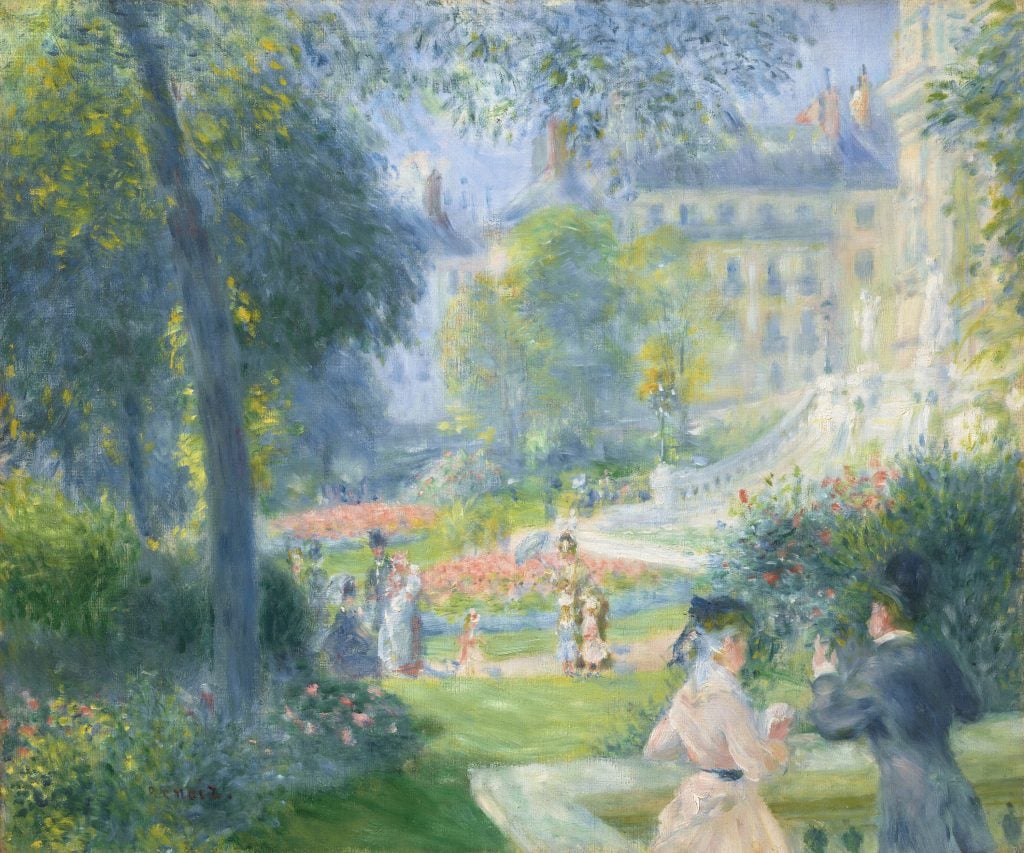
Pierre-Auguste Renoir, Square de la Trinité (1878–79). © Christie’s Images Limited 2023. Courtesy of Christie’s.
This Parisian park scene was among the works in Christie’s 20th century evening sale offered from the estate of Sophie F. Danforth, whose in-laws were instrumental in founding and leading the Rhode Island School of Design in the late 19th century. Sophie and her husband, Murray Snell Danforth Jr., inherited Square de la Trinité from his family, who originally acquired it from M. Knoedler & Co. in December 1933, meaning the work was Danforth property for just under 90 years. The extraordinary hold period undoubtedly stoked the healthy demand that it was met with; the piece hammered for $10 million ($11.9 million after fees), well above its $6 million high estimate.
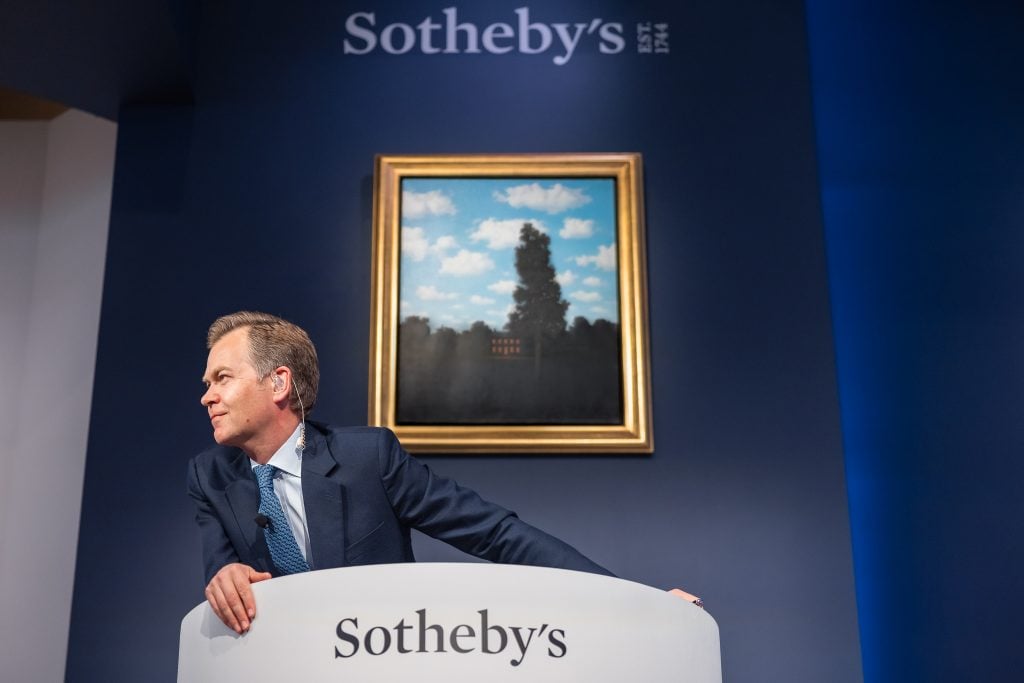
Auctioneer Oliver Barker coaxing bids from the rostrum at Sotheby’s on May 16. Courtesy of Sotheby’s/
Just as the normally unflappable, typically good-humored Oliver Barker brought down the gavel on Wassily Kandinsky’s Lyrisch, the second lot of Sotheby’s modern evening sale, he heard a call for an increase on the $1.2 million hammer price from somewhere in the audience. Barker immediately paused the proceedings, looked to the source, and asked for clarification on the bid. When he heard the response (which was inaudible on the livestream but likely a request to split the next bidding increment), Barker’s demeanor darkened, and he shot back, “No, I’m not going to take that. Make it worth my while.” The sale rolled on from there, but at least one competitor was left to think twice about their future appeals to the man holding the gavel.
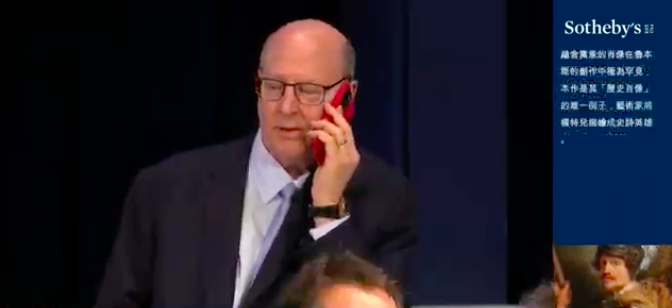
George Wachter, Sotheby’s co-chairman of Old Master paintings, taking a multimillion-dollar call with an eye-catching device. Screen capture from the livestream of Sotheby’s modern evening sale in May 2023.
While a bidder on the line with co-chairman of Old Master paintings George Wachter was trying to take Peter Paul Rubens’s Portrait of a Man as Mars from Sotheby’s modern evening sale, Wachter’s Ferrari red smartphone was giving fashion. Whether it was the actual device or just an uncommonly sporty case, the unexpected pop of color added flair to the modest competition between phone bidders that ultimately pushed the 400-year-old canvas to hammer at $22.5 million, within the $20 million to $30 million estimate range. (The premium-inclusive price was $26.2 million.) Who says the Old Masters are boring?
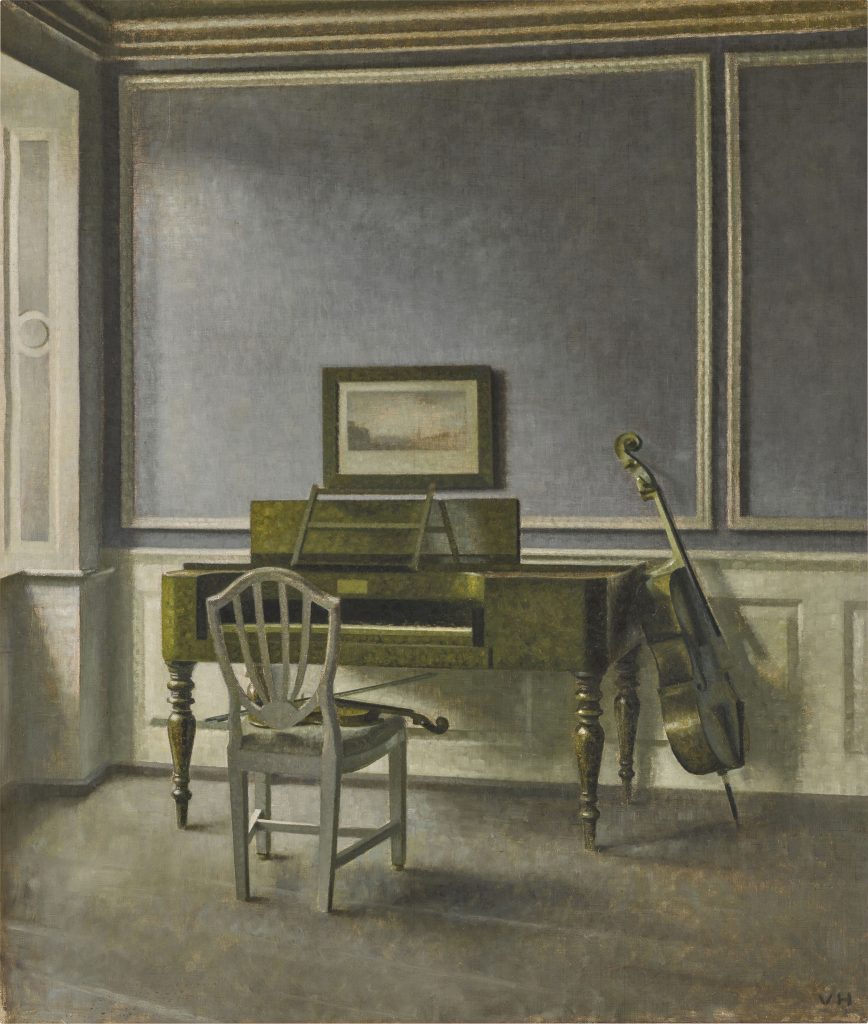
Vilhelm Hammershøi, Interior. The Music Room, Strandgade 30 (1907). Estimated at $3 million to $5 million, it sold for $9.1 million. Courtesy of Sotheby’s.
Heading into Sotheby’s modern art evening sale, Vilhelm Hammershøi’s somber and still Interior. The Music Room, Strandgade 30 carried the highest estimate ever placed on the work by the Danish painter. It attracted three bidders, including art adviser Todd Levin. The final price, which included fees, was $9.1 million, three times the low estimate of $3 million—and a new auction record for the artist (1864 – 1916). The work was acquired by a U.S. museum, according to Sotheby’s.
The top lot of the week, Jean-Michel Basquiat’s massive El Gran Espactaculo (1983) attracted some unconventional bidding activity. After the auctioneer opened the bidding around $40 million, the price rose quickly, in $1 million increments. Along with demand from two Christie’s specialists on the phone banks, there was competition coming from at least one bidder in the room, all the way up to the $50 million mark. The crowd of seasoned auction observers as well as (ahem) the press scoured the audience to see from whom the mystery bids were coming, but there were no visible signals. It turned out to be mega-dealer Larry Gagosian, who, despite being seated in the audience, used a subtle relay system with a Christie’s staffer standing to the left of auctioneer Georgina Hilton to convey his bids. In the end, Gagosian didn’t take home the work he was presumably chasing for a client. He dropped out somewhere towards the end of the bidding war, and it was hammered down to his competitor, for $58 million.
More Trending Stories:
A Sculpture Depicting King Tut as a Black Man Is Sparking International Outrage